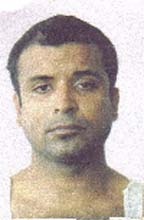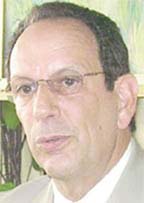A US judge on Thursday denied a request by narcotics accused Roger Khan to halt discovery proceedings in a case where he and his former lawyers are accused of conspiring to intimidate witnesses until his drug case is disposed of.
He also gave Khan deadlines of December 30, 2008 and January 26, 2009 – the latter contingent on submissions by the US government – to list which of the specific communications he intends to assert client-attorney privilege in relation to.

The judge also ordered that Khan’s former counsel Robert Simels and his co-accused Arienne Irving can also have their lawyers go through potentially privileged information obtained while Khan was their client to prepare their defence in the witness tampering case and to help Khan in asserting any privilege claims. Judge John Gleeson however denied a motion on behalf of Simels and Irving authorizing the use of such material at trial noting that there had been a previous oral commitment by the two to assist Khan in asserting privilege claims and therefore any consideration of the propriety of the use of this material at trial is premature.
On September 10, 2008 Simels and Irving were arrested for conspiring with Khan to intimidate potential witnesses in Khan’s narcotics case and on September 18 a grand jury returned an indictment against the trio for conspiring to obstruct justice.
The motions that the judge ruled on arose from the reputed collision of interests: the government’s need to comply with its disclosure obligations and Khan’s subsequent contention that some of the materials subject to disclosure are protected by his attorney-client privilege and attorney work product privilege which he was not prepared to waive.

When Simels and Irving were detained, law enforcement officials executed a search warrant at Simels’ law offices and seized electronic and non-electronic material. Separately, there were two intercepted court-approved Title 111 conversations involving Khan, Simels and Irving which occurred in the attorney’s visiting room of the Metropolitan Corrections Centre.
Dealing with these three sets of information separately, the judge noted that in relation to the non-electronic material this matter had come up before another judge and the parties then sought to devise mutually acceptable procedures for review of the evidence in which Khan’s counsel was to be involved. Judge Gleeson noted that as of the oral argument of December 12, 2008 Simels’ and Irvings’ defence counsel had decided not to begin their review of this set of material on the assumption that the materials are either privileged or classified as attorney work product.
With respect to the electronic material from Simels’ office, Khan did not file any papers regarding this request. Following agreement between the government and counsel for Simels and Irving, Special Master David Wikstrom was appointed to review the computer files and data using the staff and facilities of the Drug Enforcement Agency to separate material related to Khan’s case from that of other clients. The Khan-related material would then be provided to the government and defence counsel for privilege issues to be addressed. The relevant file directories were to be forwarded to Wikstrom on Friday.
In relation to the Title 111 intercepts it was related that the screening of the recordings for privilege purposes was still in progress but that the prosecuting Assistant US Attorneys (AUSA) had listened to limited portions cleared by the government team. Simels then applied for these recordings to be presented to the defence to determine whether attorney-client privilege had been violated by this disclosure. On November 14 it was agreed that in future none of this intercepted material would be provided to the prosecuting team until the defence had had an opportunity to review and assert any privilege claims.
As it relates to Khan’s attorney-client privilege with Simels, Judge Gleeson noted that Khan has agreed to allow Simels and Irving to reveal potentially privileged material to their counsel in order to prepare their defence and the judge concluded that in so doing Khan has not waived his privilege rights.
Judge Gleeson further found that Khan has no power to prevent Simels and Irving from revealing potential work product information to their counsel at this stage but that this does not translate into a waiver of whatever protection the work product doctrine may afford him later.
On Khan’s request to halt discovery in the tampering case, Judge Gleeson said that Khan could assert attorney-client privilege but “he has thus far failed to establish the existence of privileged information”. He argued that the party asserting privilege must clearly establish this. He dismissed Khan’s pleadings as vague and added: “Under the circumstances, of course, Khan’s present failure to establish a cognizable privilege claim is understandable. Simels, the attorney who might normally be expected to assert the privilege on Khan’s behalf, now has a declared interest in disclosing potentially protected communications. Furthermore, not all of the allegedly privileged communications are in the possession of Khan or a lawyer who currently represents him.”
The judge added that a party cannot suspend discovery indefinitely by simply failing to waive his privilege and he pointed out that Khan had been in possession of the non-electronic materials and Title 111 intercepts for several weeks. Said Judge Gleeson: “At some point, the party’s failure to affirmatively assert a cognizable claim of privilege will result in its waiver”.
Judge Gleeson then ordered that in relation to the non-electronic material and Title 111 intercepts that Khan indicate by December 30, 2008 which parts he will assert client-attorney privilege in relation to and that the government should respond by January 6, 2009 with Khan providing a rebuttal by January 13, 2009. The judge will then have a discussion on this in camera on January 16, 2009.
In relation to the electronic material being reviewed by Wikstrom, provided it is forwarded to Khan by January 5, 2009, Khan will have up to January 26, 2009 to assert client-attorney privilege and after exchanges between the two sides the judge will discuss this in camera on February 16, 2009.
Noting the thorny issues in the present matter, the judge added: “It will no doubt be difficult for Khan to litigate discovery issues in this matter while preparing for trial in his narcotics case.
However, this difficulty stems inevitably from the fact that Khan has been indicted as a defendant in two distinct criminal matters, and it does not, without more, outweigh the interests of the public, Simels, and Irving in a speedy trial of this case.”




